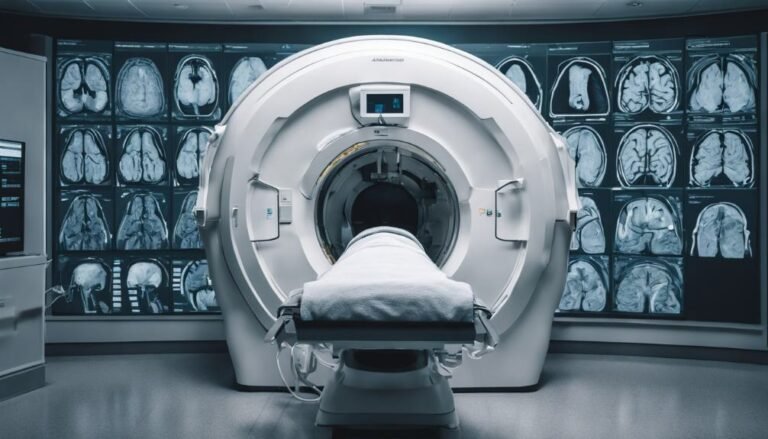AI for Sustainable Healthcare
Incorporating AI into healthcare practices presents a compelling opportunity to revolutionize the industry's sustainability efforts. By leveraging AI technologies, healthcare providers can streamline processes, enhance decision-making, and ultimately elevate patient care standards. The intersection of artificial intelligence and sustainability holds the promise of reshaping traditional healthcare paradigms, but what specific strategies and challenges does this convergence entail? Let's explore how AI can pave the way for a more sustainable and efficient healthcare ecosystem that prioritizes both patient well-being and operational effectiveness.
Key Takeaways
- Integration of AI, IoT, and big data optimizes resource allocation for sustainable healthcare.
- Enhances operational efficiency and promotes sustainable practices in the healthcare industry.
- Ethical considerations are crucial for balancing technology benefits with patient privacy.
- Advances in technology revolutionize industry efficiency for sustainable healthcare practices.
- Global implementation of sustainable healthcare is vital for addressing disparities and improving access to quality care.
The Role of AI in Healthcare
AI plays a critical role in revolutionizing healthcare by enhancing diagnostic accuracy and treatment outcomes through data analysis and predictive algorithms. However, with this advancement come important considerations regarding ethical implications, data privacy, regulatory challenges, and bias detection.
Ethical implications are a significant concern when implementing AI in healthcare. Decisions made by AI systems can deeply impact patients' lives, raising questions about accountability, transparency, and the potential for unintended consequences.
Safeguarding patient data privacy is vital to maintain trust in the healthcare system. Ensuring that sensitive medical information is securely stored and only accessed by authorized personnel is paramount.
Regulatory challenges exist in governing the use of AI in healthcare. Establishing frameworks that balance innovation with patient safety is essential. Additionally, detecting and mitigating bias in AI algorithms is crucial to prevent disparities in healthcare delivery.
Identifying and addressing biases that may exist within datasets or algorithms is imperative to guarantee fair and equitable treatment for all patients.
Advantages of AI Adoption
Implementing artificial intelligence in healthcare systems brings about numerous benefits, enhancing diagnostic accuracy and treatment outcomes through data analysis and predictive algorithms.
AI diagnostics play an important role in improving healthcare by analyzing vast amounts of patient data quickly and accurately, leading to early disease detection and personalized treatment plans.
Remote monitoring, another advantage of AI adoption, allows healthcare providers to remotely track patients' vital signs, medication adherence, and overall health status in real-time. This enables proactive interventions and reduces the need for frequent in-person visits, especially beneficial for patients with chronic conditions or those located in remote areas.
By harnessing the power of AI for diagnostics and remote monitoring, healthcare organizations can streamline processes, allocate resources more efficiently, and ultimately enhance patient outcomes while reducing costs.
The integration of AI technologies in healthcare marks a significant advancement towards more sustainable and effective healthcare delivery.
Improving Patient Care With AI
Enhancing patient care through the utilization of artificial intelligence technologies is a pivotal aspect of advancing healthcare delivery. AI plays an essential role in improving patient care by enabling remote monitoring and facilitating personalized treatment plans.
Remote monitoring, made possible by AI, allows healthcare providers to keep track of patients outside of traditional healthcare settings. This technology enables continuous monitoring of vital signs, medication adherence, and disease progression, leading to early intervention and improved outcomes. By leveraging AI algorithms, healthcare teams can receive real-time data, detect anomalies, and provide timely interventions, enhancing the overall quality of patient care.
Moreover, AI enables personalized treatment plans by analyzing vast amounts of patient data to tailor interventions based on individual characteristics. This personalized approach considers factors such as genetics, lifestyle, and past medical history to deliver targeted and effective treatments. By incorporating AI-driven insights, healthcare providers can offer more precise diagnoses, optimize therapy options, and ultimately improve patient outcomes.
Enhancing Healthcare Efficiency
To enhance healthcare efficiency, consider how AI can streamline patient appointments by automating scheduling processes and reducing wait times.
Additionally, AI can optimize medical resource allocation by predicting patient admission rates and ensuring the availability of necessary supplies and staff.
Embracing AI technologies in these areas not only improves operational effectiveness but also enhances the overall quality of care provided to patients.
Streamlining Patient Appointments
Enhancing the scheduling process for patient appointments can greatly improve operational efficiency within healthcare facilities. By implementing advanced appointment scheduling systems and enhancing patient communication, healthcare providers can streamline the booking process and reduce wait times significantly.
Automated reminders play an important role in ensuring patients show up for their appointments promptly, minimizing no-show rates and optimizing resource utilization.
Utilizing AI-powered algorithms can help predict patient appointment times more accurately, leading to better scheduling practices and reduced patient waiting times. These systems can analyze historical data to forecast patient flow, enabling healthcare facilities to allocate resources effectively and minimize bottlenecks.
Automated reminders sent via SMS or email can reduce the likelihood of missed appointments, enhancing overall patient satisfaction and treatment adherence.
Optimizing Medical Resource Allocation
Optimizing medical resource allocation in healthcare involves strategically distributing personnel, equipment, and facilities to maximize efficiency and quality of care delivery. Through resource optimization and data analysis, healthcare systems can guarantee that resources are utilized effectively to meet patient needs.
Technology integration plays a vital role in enhancing healthcare efficiency. By leveraging advanced algorithms and predictive analytics, hospitals can forecast patient demand, allocate staff based on workload, and schedule equipment maintenance to minimize downtime. Data-driven insights allow for proactive decision-making, leading to improved patient outcomes and cost savings.
Effective resource allocation not only enhances operational efficiency but also improves patient satisfaction by reducing wait times and ensuring timely access to care.
AI Solutions for Cost Reduction
AI solutions in healthcare are proving to be instrumental in cost reduction through various applications. By leveraging AI, healthcare providers can streamline processes, optimize workflows, and allocate resources more efficiently.
These advancements not only lead to financial savings but also contribute to improved patient outcomes and overall sustainability in the healthcare sector.
Cost-Saving AI Applications
Implementing artificial intelligence (AI) in healthcare operations can lead to significant cost reductions by streamlining processes and improving efficiency. AI-driven savings are being realized through the implementation of innovative technologies that offer cost-effective solutions and optimize healthcare operations.
By utilizing AI algorithms, healthcare providers can automate routine tasks such as administrative work, data entry, and appointment scheduling, freeing up valuable time for healthcare professionals to focus on patient care.
AI applications in healthcare also enable predictive analytics, which can forecast patient admission rates, optimize staffing levels, and reduce unnecessary hospital readmissions. These predictive capabilities contribute to cost savings by allowing healthcare facilities to allocate resources more efficiently and effectively.
Furthermore, AI-powered tools like chatbots and virtual health assistants are being increasingly used to provide personalized patient support, reducing the need for in-person consultations and cutting down on operational costs.
Efficient Resource Allocation
Efficiently allocating resources in healthcare through the utilization of artificial intelligence (AI) solutions is paramount for achieving significant cost reductions and operational optimization. By harnessing the power of predictive analytics, healthcare facilities can make informed decisions regarding staffing, supply chain management, and patient flow.
Predictive analytics enables healthcare providers to anticipate patient admission rates, optimize bed utilization, and forecast equipment maintenance needs, thereby streamlining resource allocation.
Resource optimization through AI not only enhances operational efficiency but also leads to substantial cost savings. AI-driven algorithms can analyze vast amounts of data to identify patterns and trends that human analysis may overlook. This data-driven approach allows for proactive decision-making, reducing unnecessary expenditures and maximizing the utilization of available resources.
Additionally, AI can help in identifying areas where resources are underutilized or overutilized, enabling healthcare organizations to reallocate these resources effectively.
Future of Sustainable Healthcare
Looking ahead to the future of sustainable healthcare, advancements in technology and data analytics are positioned to revolutionize the industry's efficiency and effectiveness. The integration of cutting-edge technologies such as artificial intelligence, Internet of Things (IoT), and big data analytics will play a vital role in optimizing resource allocation, reducing waste, and enhancing patient outcomes.
These technological advancements not only improve operational efficiency but also have a positive environmental impact by promoting sustainable practices within healthcare systems.
As we move forward, ethical considerations will be paramount in ensuring that the benefits of technology integration in healthcare are balanced with patient privacy and data security. It's essential to establish robust frameworks and guidelines to address ethical concerns surrounding AI-driven decision-making processes and the use of sensitive patient data.
Furthermore, the global implementation of sustainable healthcare practices will be crucial in addressing healthcare disparities and improving access to quality care worldwide. By leveraging technology and prioritizing sustainability, healthcare systems can work towards a future where equitable and efficient healthcare is accessible to all.
Conclusion
As you reflect on the potential of AI in healthcare, consider the remarkable coincidence of technology and sustainability shaping the future of patient care.
With AI optimizing resource allocation, improving efficiency, and reducing costs, the healthcare industry is on the brink of a transformative era.
Embrace the possibilities of a more sustainable healthcare system, where advancements in AI not only enhance patient outcomes but also contribute to a more equitable and accessible future for all.







